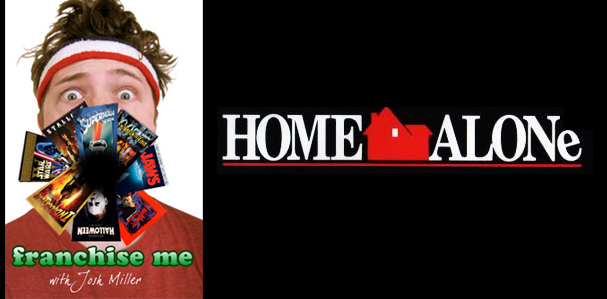
Hollywood loves a good franchise. The movie-going public does too. Horror, action, comedy, sci-fi, western, no genre is safe. And any film, no matter how seemingly stand-alone, conclusive, or inappropriate to sequel, could generate an expansive franchise. They are legion. We are surrounded. But a champion has risen from the rabble to defend us. Me. I have donned my sweats and taken up cinema’s gauntlet. Don’t try this at home. I am a professional.
Let’s be buddies on the Facebookz!
The Franchise: Home Alone — a “themed franchise” dealing with scenarios in which a small boy winds up alone in an adult world where he must fend for himself while also being pitted against the nefarious activities of adults. The franchise’s hallmarks are the clever ruses and cartoon violence that our lil’ hero uses against the adult antagonists. The series spans four films, from 1990 to 2002.
The Installment: Home Alone (1990)
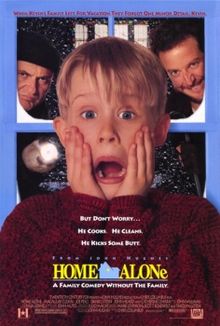
The Story:
Kevin McCallister (Macaulay Culkin) is the youngest child in a large, affluent suburban Chicago family. The film begins in a tizzy as Kevin’s family, along with the family of his Uncle Frank (Gerry Bamman), are readying themselves for an Xmas trip to Paris. Two crucial things happen during this sequence: 1) We discover that two burglars, Harry (Joe Pesci) and Marv (Daniel Stern), are casing Kevin’s neighborhood, planning a series of robberies while all the families are out of town, and 2) Kevin causes trouble during dinner, and when he’s sent to bed in the attic, he wishes that his whole family would disappear. Fate complies with Kevin’s wish, when a power-outage causes the McCallisters to sleep in late, which forces them to hurry unexpectedly to the airport — forgetting Kevin. When Kevin awakes he believes he wished his family away. Instead of being horrified, Kevin is overjoyed with his act of magical patricide, matricide, fratricide, sororicide, and other general mass-wish-murderer. All is great until Harry and Marv show up to rob the joint and Kevin must defend the house. Which he does with great success and the kind of unbridled, sadistic violence you would expect from a boy who was happy that he snuffed out the lives of fourteen blood relatives.
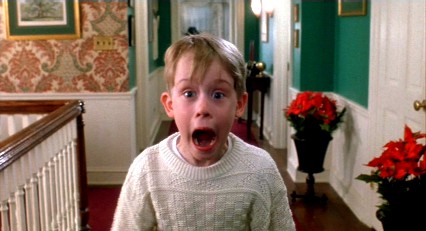
What Works:
At the moment, the late-great John Hughes is best remembered as the progenitor of the modern ‘teen film’ and of a style of comedy that one might call “heightened-naturalism” that is still felt in the films of the Apatow-verse today. But if box office dollars mean anything, I suspect that as the younger generations slide into that age-bracket/cultural sweet spot that writers such as myself currently belong to, Hughes legacy will shift to that of “Master of Violent Children’s Cinema.” Home Alone remains one of the most successful film comedies of all time, both in dollars earned and fond memories still retained, and it marked a night-and-day transition in Hughes career. After a prolific directing career between 1984 and 1989, Hughes only directed one film in the 90’s (Curly Sue), and aside from the Jennifer Connelly boobstalgia flick Career Opportunities, even as a writer he never really returned to the kinds of films that had defined him (and a whole generation) in the 1980’s, instead digging further into his new subgenre of ultra-slapstick family comedies that pit children/animals against jerkass adults, with notable films like Beethoven and 101 Dalmations, and the nadir (or apex, depending on how you look at it) of this subgenre, Baby’s Day Out. Then the reclusive Hughes mostly retired in 1998. It is tempting to look harshly on films which represent a transition point that we don’t like (such as unfairly holding post-Scream horror movies against Scream itself), and for those who belonged to the Hughes 80’s teen generation, Home Alone certainly marks the beginning of the end for that John Hughes. But for good reason. People fucking loved Home Alone. Lots of people. Because it is a great movie. What came after is what came after.
Hughes always had a cartoony sensibility. What made his style so unique and delectable to the masses was his ability to weave genuine emotion and relatable minutia into his broad, high concept tales of ditching school, bickering road-trips, or building a magic supermodel/slave. Home Alone isn’t that different. While the slapstick and Kevin’s Macgyver-cleverness became the iconic big winners of the film, Home Alone works as well as it does because of the small stuff, the ripped-from-the-boring-headlines minutia of childhood that we can all relate to. Buried beneath all the silliness, Home Alone is a spot on story about being a kid. Kevin is of course an unrealistically precocious and adept eight-year-old, but the ways in which he is a kid ring true. Surely anyone with siblings fantasized about having their house all to themselves. Most neighborhoods had the spooky house or spooky neighbor that older kids made up wild stories about to scare the younger kids. Like Kevin, I too was horrified by my house’s furnace, that always seemed to spring to life when I was in the basement. And though the film always plays it for laughs, any kid who had to spend an evening home alone without a babysitter had paranoid fantasies about someone trying to get into the house. From top-to-bottom, Home Alone is a deceptively real movie. And that’s just Kevin’s storyline. While the rest of the McCallisters exist mainly as a giant blob of comic relief, Kate McCallister’s (Catherine O’Hara) B-storyline struggle to make it home to Kevin is what makes Home Alone all-audience friendly, as most parents, especially most mothers, constantly worry about the moments in which they fail to be “perfect” parents — forgetting about soccer practice, forgetting to make a bagged lunch, etc. The whole concept of the film is basically an exaggerated nightmare version of the commonplace parenting gaffs that befall every parent with a large brood (my own father often called my brothers and I by the wrong name; humorously growing frustrated as he’d cycle through all our names til he hit the jackpot).
From a construction and execution perspective, the entire opening act to Home Alone is a masterstroke of set-up and light farce. It is basic screenwriting wisdom that your film should not have unnecessary characters or subplots. As a general rule, this is a smart one. Of course, the truly talented don’t need to follow the rules, and Hughes has a masterful ability to paint whole comedy worlds for us by jampacking characters in. In the film’s dizzying opening scene, Hughes and director Chris Columbus fit in a heroic number of bits and gags: Kevin’s cousin Fuller (super young Kieran Culkin), who everyone agrees is all but guaranteed to wet his bed if he has too much to drink; a reality that Fuller actually seems into, based on the sinister smile he gives Kevin while sipping soda. Spooky neighbor and supposed murderer, Old Man Marely (Roberts Blossom). Kevin’s older brother Buzz’s (Devin Ratray) tarantula. The running gag of the lawn jockey that every vehicle in the film can’t avoid hitting. The pizza delivery guy. And many more. The introduction of Joe Pesci’s character Harry is deceptively clever too. The running bit of Harry, disguised as a police man, trying to locate someone who actually lives in the house to talk to is funny, but more importantly Hughes came up with a simple and unobtrusive way to not only get out all the exposition we need (as Harry talks with John Heard’s Peter McCallister about their Xmas plans) but sets up Harry as a wily villain — which makes it all the more impressive and satisfying when Kevin outsmarts him later on. With any story resting heavily on farce, you need to just be prepared to accept the misunderstandings and piled-up coincidences. That said, Hughes does about as flawless of a job as conceivably possible with making the McCallister’s mislaying of Kevin feel both organic and plausible. Aside from the pretty preposterous and unclear destruction of Kevin’s plane ticket (which gets inexplicably tossed into the trash while the family cleans up a mess caused by Kevin and Buzz), Hughes and Columbus actually manage to make the absurd set-up feel legit. I particularly like the bit of farce with a nosy and annoying neighbor kid who accidentally gets mistaken for a McCallister when Kevin’s sister is performing a last-minute head count of all the siblings and cousins.
Macaulay Culkin quickly became a big joke in the 1990’s. That kind of Vanilla Ice big joke where everyone suddenly looks around the room wonders, “Who let this fucker into the party?” That was what Culkin became – I think 1993’s ill-advised dramatic pairing with Elijah Wood in The Good Son was when the tide turned in a big way – but based on Home Alone, or the previous Hughes film that got him Home Alone in the first place, Uncle Buck, Culkin is a total superstar. Adorable and unusual in his precociousness, there is a wry, almost sardonic quality to Culkin that makes his take on the stock kid-who-acts-like-an-adult character feel unique. This quality didn’t transition into a comparably appealing quality as he got older, but such is the tragedy for most child actors. Home Alone‘s most famous moments are of Culkin flying solo at home, breaking the fourth wall or talking aloud to himself, but these are actually the times that his modest talents are most apparent. As he demonstrated in Uncle Buck, it is the ways he plays off adults that is really great. The Culkin magic happens in scenes like when Kevin is out-talking a suspicious grocery store clerk:
Check-Out Woman: Where’s your mom?
Kevin: In the car.
Check-Out Woman: Where’s your father?
Kevin: He’s at work.
Check-Out Woman: What about your brothers and sisters?
Kevin: I’m an only child.
Check-Out Woman: Where do you live?
Kevin: I can’t tell you that.
Check-Out Woman: Why not?
Kevin: Because you’re a stranger.
Or Kevin talking with Ken Hudson Campbell’s (whatever happened to him? I liked him) neighborhood Santa Claus, in which Kevin astutely informs Santa that he knows what’s up regarding the Santa lie, only to reveal that he thinks department store Santa’s simply work for the real Santa. (Unrelated, but I loved that Campbell’s Santa gives Kevin his remaining Tic Tacs in lieu of a candy cane.) Culkin also has a great comedic scream, which the franchise immediately glommed onto.
The entire supporting cast is littered with stand-outs. From Kieran Culkin’s scene-stealing Fuller, to Devin Ratray’s lovably oafish Buzz, to Roberts Blossom’s Old Man Marely (you know you get teary when he hugs his grand-daughter at the end), to a heart-meltingly charming turn by the much-missed John Candy as a friendly polka band leader who helps Kate out on the last leg of her return journey. But the big lifters of the adult cast are Cathrine O’Hara, Pesci and Stern. Despite having a pretty outstanding career, O’Hara is one of those actors who never seems to fully get her due. Praised for her comedic skills in Beetlejuice and the Christopher Guest films, she is equally great in the mostly straight role of Kate, which, though less remembered than Kevin’s A-storyline, is a necessary component to balance out the film. Her scene in which she’s trying to bribe an elderly couple at the Paris airport into giving up their seats is both quietly funny and very touching. And next to Culkin, Home Alone is Pesci and Stern’s movie. The “Wet Bandits” (self-named by Marv after his pointlessly destructive sink-clogging calling card in the houses they rob) are a great classic smart guy/dumb guy duo, with Stern cast delightfully against type as a moron and Pesci making his then-novel first foray into family comedy.
Though it is the small character stuff that ultimately makes Home Alone such a success, it is undeniable that the film’s biggest selling points stem from its blatantly unrealistic bits, namely Kevin’s complicated makeshift ruses and the Looney Tunes-style ultra-violent stapstick that befalls the Wet Bandits. The degree to which adults must suspend their disbelief in regards to Kevin’s ruses is pretty high, but that is required of the movie as a whole anyway. It doesn’t make much sense why Kevin thinks he needs to fool the pizza delivery guy by using audio from the (fictional) movie Angels with Filthy Souls, instead of simply interacting with him personally. He’s a pizza guy. It’s not suspicious for a kid to answer the door. But the bit is so well-conceived – Angels having already served as a beat in Kevin’s living-it-up stage (I get to watch R-rated movies now!) – that it hardly matters. It’s funny, that’s what matters. When Kevin somehow manages to not only build an elaborate puppetting system using mannequins and a Michael Jordan cut-out to trick the Wet Bandits into thinking a Xmas party is taking place inside the house, but also manages to build it in mere minutes, my suspension of disbelief snapped. But the movie has built up so much goodwill by this point that I gladly took it in stride as silly fun.
So memorably funny is the Itchy and Scratchy showdown between Kevin and the Wet Bandits that it is easy to incorrectly remember it comprising a greater portion of Home Alone than it actually does. It spans roughly ten minutes during the climax, but it is unending slapstick gold. It also completely shits reality out of the window, both in regards to what Kevin is capable of pulling off and what the human body is able to withstand without someone needing to go immediately to the hospital. This section of the film is also surely why Home Alone was such a success globally, as slapstick is the universal comedy language — a dude getting hit in the face with a paint bucket is funny everywhere. I have very little respect for Chris Columbus as a director, but the comedy timing to this sequence is undeniable in places. I love the execution of the iron “trap,” in which Marv pulls on a basement light chain, only to find the chain quickly elongating and falling rapidly to the floor. The slow beat of Marv looking upwards to see where all this chain/string is coming from is what sells the moment, far more so than the actual iron hitting him in the face. Though the grotesque red mark it leaves on his face is pretty hilarious too. The moment in this sequence that actually got me laughing hardest is after Marv is bitten by Buzz’s tarantula (Stern’s high-pitched scream is priceless), when Marv is readying to bash the spider to death with a crowbar while it is on Harry’s chest. This is the stuff comedy is made off, as Harry’s reaction to Marv readying to swing the crowbar is much funnier than when Marv finally does swing the crowbar. Home Alone also popularized what I like to call the “Home Alone Fall” in which a character either slips on something or is otherwise propelled off their feet at such a velocity that they become completely horizontal in midair, then fall straight to the ground, unbraced onto their back. Ouch.
Home Alone usually isn’t championed as one of John Williams’s best scores, but it is pretty scrumptious. A wonderful Christmasy concoction that sounds equally as iconic as the famous Christmas instrumental pieces also mixed into the soundtrack. It is at times hard to tell where Williams ends and the existing tunes begin.
This isn’t actually praise, more so just a ponder-piece for ya, but there are some interesting things happening beneath the surface of Home Alone. Despite what we see in that Home Alone title logo, the McCallisters do not live in an average looking middle-class home. They are squarely upper-middle-class, maybe not rich but monied enough that Peter McCallister is flying fifteen people to Paris during the holidays. The McCallisters being well-off is a necessary component of the concept, as the Wet Bandits aren’t going to go to much trouble robbing an ordinary family — Harry tells us that the McCallister house is their biggest prize. Hughes generally wrote about the moderately privileged, and it is a testament to his ability to find the relatable humanity in his characters that the McCallister’s being rich doesn’t make us dislike them on any level, even though much of what happens in the film couldn’t happen in a movie about a family of lesser means. Only a total asshole wouldn’t feel empathy for Kate McCallister while she is worrying about her son, but all her scenes journeying back to Kevin involve her blowing tons of money. At every turn she is held up by random chance, not by personal circumstance. Similarly, it is interesting how Hughes and Columbus get us to laugh and smile at Kevin’s happy discovery that he wished his entire family out of existance. It is frankly pretty appropriate that Pesci’s character, Harry Lyme, shares the same name with Orson Welles sociopathic character in The Third Man. Welles’ Harry Lime waxed philosophically about the irrelevancy of wiping out human lives. Kevin McCallister apparently shares a similar feeling, happy to have killed his own mother and father with one wish.
This has nothing to do with anything, but watching Home Alone now in 2011 it is interesting all the subtle ways this film simply couldn’t work in today’s reality. Cell phones and email, for one thing. But the entire Act I airport frenzy feels enviably antiquated in our post-9/11 world, where you have to show up 45 minutes before your flight and stand for hours in security and bag check-in lines around holidays.
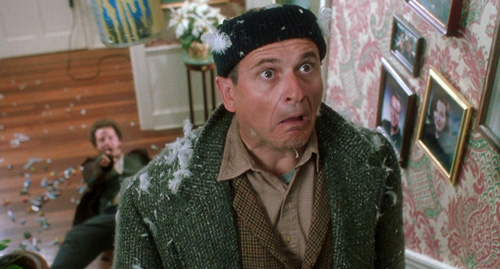
What Doesn’t Work:
Overall I wouldn’t say anything in Home Alone doesn’t work. Nothing is holding the film back. But there are areas in which it could have been even better.
Sometimes ignoring certain realities is the best course for movies that are already stretching believability pretty aggressively. Like the moment in Paris when Kevin’s aunt informs Kevin’s parents that she literally couldn’t reach anyone they know via phone to go help Kevin. Obviously we need to see the McCallisters trying to save Kevin, but after a certain point it starts to become ridiculous in an unfunny way. We’re talking about an eight-year-old stranded at home while his parents are on another continent. Not one of the dozen-plus McCallisters knows someone still hanging out in their town who can go check on Kevin? He’s eight! People freak the fuck out about stuff like that. Someone would drive several hours out of their way to go save that little guy. Yes, yes, it’s just a silly movie, but farce is an inherently precarious style, and willingly exposing the various cracks in the foundation just gets in the way.
Along these same lines, given the slickness with which the ridiculous set-up of the film is organically laid out, much of the violent climax seems oddly lazy. Marv and Harry so perfectly play into Kevin’s hands that it actually removes some of Kevin’s cleverness by removing any semblance of contextual plausibility. Kevin covers the basement stairs with tar. When Marv goes to climb up the stairs, he manages to lose both his shoes and both his socks. You’d think that after losing two shoes and a sock he might give up temporarily to rethink the situation, and, if nothing else, reclaim his shoes from the tar. Even in the context of this cartoon silliness I didn’t buy that Marv would abandon his shoes. It’s not like tar is cement. This is aggravated by the gag’s follow up, when Marv leaves the basement (for no reason; he still could’ve gone up the stairs after stepping on a nail) and sneaks in through a window. On the floor Kevin has placed Xmas ornaments, which Marv steps on, cutting his feet. So… Kevin not only knew that Marv would abandon his shoes in the basement, but would then try and climb in that window? What if he had gone into the window first, with shoes on? Or if Harry had? The ornaments would’ve done nothing. This stuff plays gangbusters for the kiddies, but viewing the film as an adult, this slapstick climax was actually one of the weaker areas of the film for me. And while Kevin’s befriending of Old Man Marely is a great character arc pay-off, it is pretty goddamn convenient that even though Marv and Harry just withstood some of the most painful looking injuries ever, this seventy-year-old man was able to knock them both unconscious with a snow shovel. For those who have never lived somewhere with snow, unlike a dirt shovel, snow shovels are much thinner and lightweight. You ain’t knocking someone out with a snow shovel; certainly not in a world where irons and full paint cans don’t knock people out.
Re-using the Angels With Filthy Souls bit twice feels weird and uninspired in such an inspired and fantastic movie. It is great as a throwaway with the pizza delivery guy, but when Kevin uses it again to fool Marv it feels flimsy and is pushing just how dumb Marv is a bit too far. The reason the pizza guy gag works is because Kevin is only using Johnny’s (Ralph Foody) dialogue, so a conversation is farcically allowed to happen between the movie and the pizza guy. Marv simply overhears the film, which is simply too farcical that Marv assumes he’s hearing real-life and not TV. Also, this ruse doesn’t even accomplish anything, as Harry is dubious of what Marv felt he overheard and in the next scene Harry deduces that Kevin is just home alone and fooling them anyway.
This is a majorly irrelevant complaint, but what kind of little boy is grossed out when he finds his older brother’s porno? That is the kind of magical childhood moment males tell stories about for the rest of their lives, and that story is never, “I found my brother’s Playboy and then promptly tossed it aside, barely looking at it.” Unless the story is part of a larger story about the moment they realized they were gay, I suppose.
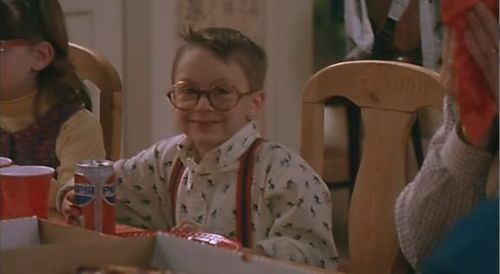
Home Alone Falls: 4
Moments Where A Villain Would Have Seriously Died: Marv’s iron to the face. That one-story drop right onto Marv’s forehead would have surely cracked his skull and caused serious brain-swelling.
Injury That Is More Horrifying Than Funny: When Harry has the top of his head burnt off, leaving scarred and exposed scalp where his hat and hair once were. That’s fucking awful.
Most Preposterous Ruse: Where the hell did Kevin get his costume and prop when he hides from Harry and Marv amongst the figures in a church’s nativity manger scene? Were they just lying around or something?
Best Kid Acting Like an Adult Moment: When Kevin gives the Check-Out Girl a coupon for his orange juice, and notes that he clipped it from the morning paper.
Should There Be a Sequel: Huh? No. How could there be a sequel? What, is Kevin going to get separated from his parents again and somehow inexplicably run into the exact same criminals again? That’s just silly.
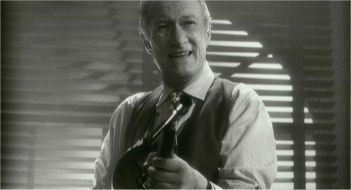
Up Next: Home Alone 2: Lost in New York.
DISCUSS THE FRANCHISE ON THE BOARDS
previous franchises battled
Critters
Death Wish
Hellraiser
Leprechaun
The Muppets
Phantasm
Planet of the Apes
Police Academy
Rambo
Tremors